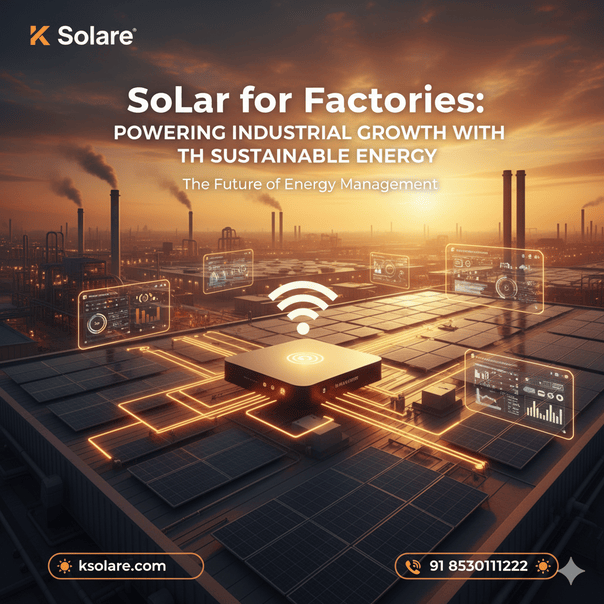The growing emphasis on sustainability and energy efficiency has made solar for factories a smart and strategic investment across India. With rising energy costs and increasing environmental concerns, industries are turning to solar power to meet their heavy electricity demands in a clean and cost-effective way.
The shift toward solar energy is not only helping factories reduce operational expenses but also establishing them as responsible, eco-friendly enterprises. The use of 3 phase inverters and other high-performance technologies ensures that large-scale solar systems can seamlessly power machinery, lighting, and equipment with stability and efficiency.
Why Solar for Factories Is a Game-Changer
Factories consume massive amounts of electricity every day — from production lines and heavy machines to HVAC systems and lighting. By investing in solar for factories, businesses can significantly cut down their dependency on conventional grid power and shield themselves from rising utility rates.
Key Benefits of Solar for Factories:
- Reduced energy bills: Solar power slashes monthly electricity costs by up to 70%.
- Energy independence: Factories can generate their own power, reducing grid reliance.
- Long-term ROI: The system pays for itself through energy savings within a few years.
- Sustainability: Reduces carbon emissions and supports green manufacturing goals.
- Government incentives: Avail subsidies, accelerated depreciation, and tax benefits.
Understanding Industrial Solar Inverters
Industrial solar systems require high-capacity inverters that can handle large power loads with maximum efficiency. The 3 phase inverter is the backbone of such setups, ensuring smooth energy conversion and distribution across the facility.
What Makes 3 Phase Inverters Ideal for Factories:
- Stable Power Supply: Ensures balanced load across all industrial machines.
- Higher Efficiency: Converts DC to AC power with minimal energy loss.
- Scalability: Easily adaptable for small factories or large industrial parks.
- Durability: Built for heavy-duty usage and harsh environmental conditions.
- Smart Monitoring: WiFi and IoT-based systems for real-time energy tracking.
These features make the 3 phase inverter an essential component in any industrial solar setup, ensuring uninterrupted power flow and improved performance.
Choosing the Best Inverter for Industrial Solar Use
Selecting the best inverter for industrial solar use is crucial to achieving consistent output, operational reliability, and long-term cost savings. Industrial inverters are designed to handle fluctuating loads, operate under high temperatures, and integrate seamlessly with solar panels and grid systems.
Features of the Best Industrial Solar Inverters:
- High conversion efficiency (97–99%).
- Robust surge protection and temperature control.
- Remote monitoring via mobile or web platforms.
- Compatibility with various solar panel types.
- Long lifespan and easy service accessibility.
Leading manufacturers like Ksolare specialize in offering advanced 3 phase inverters that are ideal for industrial and commercial use. With proven reliability, performance, and after-sales support, Ksolare ensures every solar project delivers optimal output and long-term stability.
Applications of Solar for Factories and Industries
Solar power can be applied across various industrial sectors — from small manufacturing units to large-scale production plants.
Common Industrial Applications:
- Textile, food processing, and chemical industries.
- Warehouses and logistics centers.
- Automotive and heavy engineering factories.
- Cold storage and packaging facilities.
- Large office and IT campuses.
By installing solar for factories, businesses not only achieve energy savings but also build a strong reputation as sustainable organizations committed to cleaner energy.
Maximizing ROI on Industrial Solar Systems
The success of an industrial solar setup depends on system quality, inverter performance, and proper maintenance.
How to Maximize Value from Solar Installations:
- Conduct an energy audit to determine your exact requirements.
- Choose the best inverter for industrial solar use for reliable, high-load operation.
- Opt for a 3 phase inverter for balanced and efficient power distribution.
- Schedule routine maintenance and performance checks.
- Take advantage of financial incentives and depreciation benefits.
When implemented strategically, solar energy can help industries achieve complete energy independence within a few years, making it a sound business decision.
Long-Term Advantages of Industrial Solar Power
Investing in solar for factories delivers both economic and environmental benefits. Over time, the reduced energy expenses and improved operational stability contribute to a stronger bottom line.
Long-Term Benefits Include:
- Major reduction in electricity expenses.
- Protection against fluctuating grid tariffs.
- Reliable energy supply for critical industrial operations.
- Reduced carbon footprint and improved brand image.
- Higher asset value and sustainability compliance.
By adopting solar energy solutions from trusted brands like Ksolare, industries can future-proof their operations and move closer to achieving zero-emission goals.
Conclusion
As industries evolve toward cleaner energy models, solar for factories has become a cornerstone of modern manufacturing and commercial operations. The integration of 3 phase inverters and advanced solar technologies ensures uninterrupted, efficient power for demanding environments Know more.
Choosing the best inverter for industrial solar use from reputed manufacturers like Ksolare guarantees consistent performance, robust safety, and long-term financial returns. With the right system in place, factories can power growth sustainably — one solar unit at a time.
FAQs
Q1. Why is solar power ideal for factories?
Factories have high energy demands, and solar for factories helps reduce electricity bills, ensures stable power supply, and supports sustainability goals.
Q2. What is a 3 phase inverter and why is it important for industries?
A 3 phase inverter efficiently converts DC to AC power and distributes it evenly across industrial machinery, ensuring smooth and reliable operation.
Q3. How do I choose the best inverter for industrial solar use?
Look for inverters with high efficiency, robust build quality, and remote monitoring features. Brands like Ksolare are known for reliable performance and service.
Q4. Are solar systems for factories cost-effective in the long run?
Yes, the savings on electricity bills over time often exceed the initial investment, offering a strong return within 3–5 years.
Q5. Can solar inverters support 24/7 factory operations?
Yes, when paired with the right capacity system and backup options, industrial inverters ensure uninterrupted energy supply around the clock.

